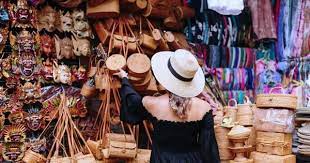What is tourism without art and craft? The art and craft Industry in Nigeria is a reflection of the country’s rich and diverse culture. The history of Nigeria’s art and craft business is lengthy and intriguing, going back to prehistoric times. Painting, sculpture, ceramics, weaving, beadwork, and metalwork are just a few of the many creative forms that make up the art and craft sector of Nigeria. These forms are distinct from other types of art because each has its history, cultural relevance, and aesthetic
Famous Art Centers In Nigeria
As a tourist or a lover of art, there are must-stop places you need to visit. The following art galleries are considered one of the best places to be.
Nike Art Gallery
Have you ever been completely blown away by the beauty of art? The Nike Art Gallery always blows the mind of anyone visiting for the first time. The gallery is a five-story building that contains over 8,000 beautiful works of art. It is said to be the largest art gallery in West Africa.
The gallery features several traditional and contemporary Nigerian art and craft, including painting, sculpture, textiles, beadwork, and more. Many of the works on display were created by local artists and artisans who have received training and support from the gallery.
In addition to its art gallery, the Nike Art Gallery also features a textile museum, where visitors can learn about the history and techniques of Nigerian textile arts, such as adire and aso-oke. The gallery also offers workshops and training programs for aspiring artists and artisans, helping to support the development of the Nigerian art and craft industry.
The gallery was founded by Nike Okundaye, a Nigerian textile artist popularly known and called “MAMA NIKE” who is an experienced professional artist, painter, textile artist, weaver, embroiderer, and prize winner at several national and international art events.

Terra Kulture
Terra Kulture is a popular art gallery and cultural center located in Lagos, Nigeria. Founded in 2004 by Bolanle Austen-Peters, Terra Kulture has become a hub for Nigerian art and culture, showcasing the works of Nigerian artists and promoting Nigerian culture through various events and activities.
The gallery features several contemporary Nigerian arts, including painting, sculpture, photography, and mixed media. The gallery also hosts regular exhibitions, art workshops, and other events that promote Nigerian art and culture.
In addition to its art gallery, Terra Kulture also features a theatre, a restaurant, and a bookshop that specializes in Nigerian literature. The theatre hosts regular performances of Nigerian plays and musicals, while the restaurant serves Nigerian cuisine and hosts cultural events such as live music performances.
Thought Pyramid Art Centre
The Thought Pyramid Art Centre is a Nigerian contemporary art gallery located in Abuja. Chief Bolaji Ogunwo, an artist and curator, launched it in 2008 to promote modern Nigerian art and provide a forum for young artists.
Painting, sculpture, photography, video art, and installations are among the many forms of modern Nigerian art displayed at the gallery. The center is well-known for presenting the works of both new and famous Nigerian artists.
The Thought Pyramid Art Centre, in addition to art exhibitions, organizes workshops, art discussions, and other activities aimed at promoting and educating the public about contemporary Nigerian art. The institute also provides artist residencies and mentorship programs for aspiring artists.
The gallery itself is a spectacular piece of contemporary architecture, with its unusual shape and style sticking out in Abuja’s cityscape; the inside is vast and modern, offering a great backdrop for the presentation of contemporary art.
Investing in the Business of Arts and Crafts in Nigeria
The worldwide Arts and Crafts sector is a booming market with enormous development potential. According to the most recent data, the worldwide Arts & Crafts market is expected to be worth USD 30.24 billion in 2020. China continues to be one of the world’s major exporters of arts and crafts, accounting for 47.2% of total exports.
Overall, these data show an ever-increasing demand for creativity in our society, which will continue to fuel innovation in all sectors of this business through 2021.
Invest in an art collection.
A well-curated art collection is an excellent investment for various reasons. It’s a financial investment in beauty. Art is more than simply something to display on your wall or hang in your office; it is something that will last and be enjoyable to look at.
These well-curated collections are frequently sold at auction houses, making them simple to sell and get your money back when you need it. The larger your art collection, the greater your return on investment, because larger items sell for more at auction.
Start An Auction House
The country’s art industry is thriving and taking advantage of opportunities in the global art market, which is valued at over $50 billion and had an auction turnover of $8.45 billion in 2017, an increase of 18%, with impressive sales of over N400 million from more than 200 pieces sold at auctions throughout Nigeria in 2018.
With only three major art auction houses in Nigeria, the art auction business is not saturated. There is room for investors to venture into the market.
Start an Art Consultancy and Advisory Business
The art sector is incomplete without art consultants and advisory services, which offer collectors, institutions, businesses, and people specialized knowledge and direction. These services cover a wide range of the art market, including the buying and selling of art, collection management, market research, valuation, curatorial advice, conservation, and art education. Along with the country’s thriving art scene, Nigeria has experienced an expansion in the art consultancy and advising business.
In Nigeria, the art consultancy and advisory sector has witnessed growth in response to the expanding art market and the rising demand for professional guidance. These firms collaborate with artists, collectors, galleries, institutions, and government agencies to elevate the profile of Nigerian art, support emerging talents, and contribute to the overall development and sustainability of the art industry.
Conclusion
Art and craft businesses have huge opportunities for investors to explore.
Overall, the art and craft business environment in Nigeria is characterised by immense talent, cultural diversity, and a growing market. With continued support, investment, and collaboration, the industry has the potential to flourish, contributing to Nigeria’s cultural richness, economic growth, and international recognition in the global art scene.












